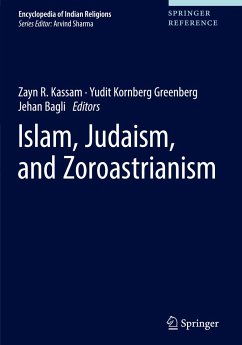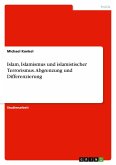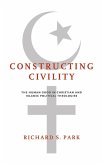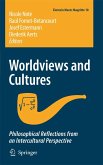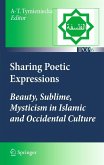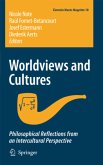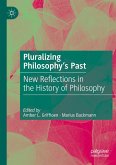Islam, Judaism, and Zoroastrianism
Herausgegeben:Kassam, Zayn R.; Greenberg, Yudit Kornberg; Bagli, Jehan
Islam, Judaism, and Zoroastrianism
Herausgegeben:Kassam, Zayn R.; Greenberg, Yudit Kornberg; Bagli, Jehan
- Gebundenes Buch
- Merkliste
- Auf die Merkliste
- Bewerten Bewerten
- Teilen
- Produkt teilen
- Produkterinnerung
- Produkterinnerung
The earlier volume in this series dealt with two religions of Indian origin, namely, Buddhism and Jainism. The Indian religious scene, however, is characterized by not only religions which originated in India but also by religions which entered India from outside India and made their home here. Thus religious life in India has been enlivened throughout its history by the presence of religions of foreign origin on its soil almost from the very time they came into existence. This volume covers three such religions-Zoraoastrianism, Judaism, and Islam . In the case of Zoraostianism, even its very…mehr
Andere Kunden interessierten sich auch für
![Islam, Islamismus und islamistischer Terrorismus. Abgrenzung und Differenzierung Islam, Islamismus und islamistischer Terrorismus. Abgrenzung und Differenzierung]() Michael KonkelIslam, Islamismus und islamistischer Terrorismus. Abgrenzung und Differenzierung17,95 €
Michael KonkelIslam, Islamismus und islamistischer Terrorismus. Abgrenzung und Differenzierung17,95 €![Constructing Civility Constructing Civility]() Richard S. ParkConstructing Civility46,99 €
Richard S. ParkConstructing Civility46,99 €![Worldviews and Cultures Worldviews and Cultures]() Nicole Note / R Fornet-Betancourt / Josef Estermann / Diederik Aerts (ed.)Worldviews and Cultures75,99 €
Nicole Note / R Fornet-Betancourt / Josef Estermann / Diederik Aerts (ed.)Worldviews and Cultures75,99 €![Sharing Poetic Expressions Sharing Poetic Expressions]() Sharing Poetic Expressions75,99 €
Sharing Poetic Expressions75,99 €![Worldviews and Cultures Worldviews and Cultures]() Worldviews and Cultures81,99 €
Worldviews and Cultures81,99 €![Pluralizing Philosophy's Past Pluralizing Philosophy's Past]() Pluralizing Philosophy's Past90,99 €
Pluralizing Philosophy's Past90,99 €![Heidegger and the Death of God Heidegger and the Death of God]() Duane ArmitageHeidegger and the Death of God41,99 €
Duane ArmitageHeidegger and the Death of God41,99 €-
-
-
The earlier volume in this series dealt with two religions of Indian origin, namely, Buddhism and Jainism. The Indian religious scene, however, is characterized by not only religions which originated in India but also by religions which entered India from outside India and made their home here. Thus religious life in India has been enlivened throughout its history by the presence of religions of foreign origin on its soil almost from the very time they came into existence. This volume covers three such religions-Zoraoastrianism, Judaism, and Islam . In the case of Zoraostianism, even its very beginnings are intertwined with India, as Zoroastrianism reformed a preexisting religion which had strong links to the Vedic heritage of India. This relationship took on a new dimension when a Zoroastrian community, fearing persecution in Persia after its Arab conquest, sought shelter in western India and ultimately went on to produce India's pioneering nationalist in the figure ofDadabhai Naoroji ( 1825-1917), also known as the Grand Old Man of India. Jews found refuge in south India after the destruction of the Temple by the Romans in 70 C.E. and have remained a part of the Indian religious scene since then, some even returning to Israel after it was founded in 1948. Islam arrived in Kerala as soon as it was founded and one of the earliest mosques in the history of Islam is found in India. Islam differs from the previously mentioned religions inasmuch as it went on to gain political hegemony over parts of the country for considerable periods of time, which meant that its impact on the religious life of the subcontinent has been greater compared to the other religions. It has also meant that Islam has existed in a religiously plural environment in India for a longer period than elsewhere in the world so that not only has Islam left a mark on India, India has also left its mark on it. Indeed all the three religions covered in this volume share this dual feature,that they have profoundly influenced Indian religious life and have also in turn been profoundly influenced by their presence in India.
Produktdetails
- Produktdetails
- Encyclopedia of Indian Religions
- Verlag: Springer / Springer Netherlands
- Artikelnr. des Verlages: 978-94-024-1266-6
- 1st ed. 2018
- Seitenzahl: 856
- Erscheinungstermin: 16. Juli 2018
- Englisch
- Abmessung: 260mm x 183mm x 48mm
- Gewicht: 2092g
- ISBN-13: 9789402412666
- ISBN-10: 9402412662
- Artikelnr.: 50209077
- Herstellerkennzeichnung Die Herstellerinformationen sind derzeit nicht verfügbar.
- Encyclopedia of Indian Religions
- Verlag: Springer / Springer Netherlands
- Artikelnr. des Verlages: 978-94-024-1266-6
- 1st ed. 2018
- Seitenzahl: 856
- Erscheinungstermin: 16. Juli 2018
- Englisch
- Abmessung: 260mm x 183mm x 48mm
- Gewicht: 2092g
- ISBN-13: 9789402412666
- ISBN-10: 9402412662
- Artikelnr.: 50209077
- Herstellerkennzeichnung Die Herstellerinformationen sind derzeit nicht verfügbar.
Zayn Kassam is the John Knox McLean Professor of Religious Studies at Pomona College in Claremont, CA. The winner of three Wig Awards for Distinguished Teaching, she has also won the national American Academy of Religion award for Excellence in Teaching and the Theta Alpha Kappa Kathleen Connolly-Weinart Leader of the Year Award. Kassam has authored a volume on Islam (Greenwood Press, 2005), and also edited a volume titled Women and Islam (2010). She has published articles on religion and migration, on pedagogy, feminist Muslim hermeneutics, and Muslim Women and globalization. Her current research investigates contemporary challenges facing Muslim women. She teaches courses on women in Islam, Islamic mysticism, Islamic thought, as well as contemporary Muslim literature. More recently, she has also been teaching courses on religion and the environment. Dr. Kassam's service to the profession includes serving on American Academy of Religion national steering committees for the Study of Islam; Childhood Studies in Religion; Liberal Theologies; Religion and Migration; and the Islam, Gender, Women Group. She is also a board member for the highly acclaimedJournal of Feminist Studies in Religion, as well as a consulting editor on Twentieth Century Religious Thought: Vol II, Islam. Yudit Kornberg Greenberg is the George D. and Harriet W. Cornell Endowed Chair of Religion and Founding Director of the Jewish Studies Program at Rollins College in Winter Park, Florida. Her fields of teaching and research include modern and contemporary Jewish thought, comparative religion, women and religion, and cross-cultural views of love and the body. Dr. Greenberg is the author of Better than Wine: Love, Poetry and Prayer in the Thought of Franz Rosenzweig, the 2 volume Encyclopedia of Love in World Religions, nominated for the American Academy of Religion Book award for 2009, and editor of From Spinoza to Levinas: Hermeneutical, Ethical, and Political Issues in Modern and Contemporary Jewish Philosophy . She has written numerous articles and essays in modern and contemporary Jewish thought, and in comparative Hinduism and Judaism. Her current projects include Body in Religion: Cross-cultural Perspectives, Bloomsbury Publishers, 2016, and Hindu and Jewish Philosophy and Religion: Comparative Perspectives, Lexington Books, 2016. Dr. Greenberg lectures nationally and internationally on topics related to love and the body. She has been active at numerous scholarly societies and organizations such as the Association for Jewish Studies, the Parliament of the Worlds Religions, the Franz Rosenzweig International Society, and the American Academy of Religion, where she served as co-chair of the Studies in Judaism Section and the Comparative Study of Judaisms and Hinduisms Group. She serves on the editorial board of the Journal of the American Academy of Religion, and is General Editor of Studies in Judaism Series for Peter Lang Academic Publishers. Dr. Greenberg is a recipient of numerous awards including two Fulbright Scholar Awards; the Cornell distinguished Faculty Award and the Arthur Vining Davis Award from Rollins College, the Templeton Course Prize in Science and Religion, and the Harvard University Pluralism Project grant. She is an annual summer fellow at the Van Leer Institute in Jerusalem and was a Fulbright-Nehru Scholar in 2015 at Jindal Global University in India. Jehan Bagli is an ordained Zoroastrian priest through Navar and Murtab ceremonies. He was a founding member and President of Zoroastrian Association of Quebec, the editor of Gavashni, a North American Zarathushti publication, for 16 years (1974-1990), and founding editor of FEZANA journal (1988-90). Heis immediate past president of North American Mobed Council (NAMC). Presently, he is the Chairperson of the Research and Preservation Committee of Federation of Zoroastrian Associations of North America, (FEZANA), and the International Board member of World Zoroastrian Organization. He has lectured extensively on numerous religious topics at various conferences and symposia. These include North American Zoroastrian Congresses at Toronto, Chicago, California, Vancouver, and Philadelphia and at various Anjumans in N.America. He was also invited by Zoroastrian organizations to give lectures in India, Pakistan, Australia and South Africa. He has published widely, on various topics, on the religion of Zarathushtra. He is the author/co-author of five books. "Religion of Asho Zarathusht and Influence through The Ages" (2003), and co-author of "Understanding and Practice of Jashan Ceremony" (2001), "Understanding and Practice of Obsequies" (2006), Congregational prayers (2007), "Understanding and Practice of Navjote and wedding ceremonies (2010) and Understanding and Practice of Concise Naavar ceremony (2014). Most recently he has been the author of 'Zoroastrian Theology and Eschatology' as well as the section editor for 'Zoroastrian Religion' for the Encyclopedia of Indian Religions to be published by Springer publications. Professionally he is retired Distinguished Research Fellow of Wyeth/Ayrest Pharmaceutical Research, and is currently a Research Consultant. He was a recipient of the Gold Medal of Indian Pharmaceutical Association, of the fellowships from the U.S. Public Health Service, U.S. National Institute of Health, and of the National Research Council of Canada. He also received the award of Excellence in Profession/Business from Federation of Zoroastrian Associations of North America, recognized by ZSO, ZAQ, ZAGNY and is an elected fellow of the Chemical Institute of Canada.
Islam: Data Ganj Bakhsh (Hojviri).- Farid al-Din al-Mas ud.- Kubrawiyah.- Qadiriyah.- Amir 'Ali.- Abu'l Kalam Azad.- Abu al-Fadl.- Aga Khan.- Allama Mashriqi.- Chishti Order.- Bidel.- Gesudaraz, Sayyid.- Sir William Muir.- Saiyad Sultan.- Calcutta Madrasah.- Hallaj, al-.- Missionaries.- Sayyid Ahmed Barelvi .- Shibli Numani.- Ubaid Allah Sindhi.- Akbar.- Alfi Movements.- Ashraf 'Ali Thanawi.- Barani, iya al-Din.- Barelwis.- Al-Biruni.- Caste Islam.- Dars-i-Ni amiya.- Abd 'l-Rahim Khan-i-Khanan.- Deoband School.- Fatwa.- Fatawa'l Alamgira.- Mirza Asadullah Khan Ghalib.- Hidayah.- 'Ibadat Khana.- Nizari Isma'ilis.- Ithna 'Ashari Shi'ism: .- Sri Lanka Jamaat-e-Islami.- Jama'at-Khana.- Khojas.- Khwaja Muin al-Din Chishti.- Madrasah.- Mahmud Ghaznavi.- Muslim Personal Law.- Naqvi, Ayatullah 'Ali Naqi.- Nizam-ud-Din Awliya.- Politics, Islam.- Rashid Ahmad Gangohi.- Qawwali.- Qur an Translation in South Asia.- Sama'.- Shaykh Shihab al-Din al-Suhrawardi.- Suhrawardi Order.- Taqiyya.- Tazkirah.- Tablighi Jama'at.- Ibn Taymiyya.- Ala al-din Khalji.- Seyyed Hossein Nasr.- Khwaja Enayetpuri.- Sawm.- Nafs.- ×udud.- Prayer, Islam.- Tawhid.- Ummah.- Wilfred Cantwell Smith.- Bhutto, Benazir.- Bhutto, Zulfikar.- Khan, Liaquat Ali.- Zia ul-Haq.- Aligarh Muslim.- Anglo-Mohammedan Law.- Ayodhya dispute.- Bangladesh (Islam and Muslims).- Bengal (Islam and Muslims).- Jihad.- Zia, Begum Khaleda.- Two Nation Theory.- Zakir Hussain.- Mahmood, Justice Syed.- Sheikh Hasina.- Maulana Fazlur.- Rahman Ansari.- Mujibur Rahman, Shaykh.- Grameen Bank.- Congress, Muslims.- Fara'izi Movement.- Jama'at-i-Islami Bangladesh.- Lal Shahbaz Qalandar (d. 665/1267 or 673/1274).- Malang.- Malamatis.- Qalandar.- Iraqi, Fakhruddin (ca. 610-688/1213 or 1214-1289).- Jinnah, Muhammad 'Ali.- Ghulam 'Ali "Azad" Bilgrami (d. 1786).- Abd al-Qadir Bada'uni (1540-1615).- MAULANA ABDUL ALEEM SIDDIQUE.- Amir Khusrau.- Umaruppulavar.- Tamil Nadu (Islamand Muslims).- Nagore Dargah.- Vannapparimalappulavar.- Coromandel Coast.- Sri Lanka (Islam and Muslims).- Kadir, Shaykh Abdul.- Siddi Lebbe, Mohammed Cassim.- Ahmedabad.- Jahanara Begum.- Nizari Ismailis.- Syncretism.- Nabuwat.- Wahy.- Karim al-Husseini, Shah.- KHAN, (NAWWAB) SIDD Q HASAN.- Y NAN MEDICINE .- Ghurids.- Wahhabism in Sri Lanka.- Aibek (Aybeg), Qu b al-Din.- Fakhr-i Mudabbir.- Juzjani, Minhaj al-Din.- Mas'ud I.- pir.- Jalal ad-Din Mujarrad.- Hasan Raja of Sunamganj.- Dara Shukoh .- Hali, Altaf Husayn.- Secularization, Islam.- Sir Sayyid Ahmad Khan.- Arzu, Siraj al-Din 'Ali han (d. 1756).- Garcin de Tassy.- Sauda, Mirza (d. 1781).- Saadat Hasan Man .- Chu ta i, Ismat.- Mujarrad, Shah Jalal.- Naqshbandiyah.- Aqiqa.- Ijtihad.- Aga Khan Foundation.- Pir Sadr al-Din.- Pir Hasan Kabir al-Din.- Satpanth.- Ahmad Ra a Khan.- Bahmanid Sultanate.- Balban, Ghiyas al-Din.- Delhi Sultanate .- Mir Hasan.- cUmaribncAbd-al-cAziz (680-719/61-101).- Khilafat Movement.- IbnBa u a, AbucAbdAllahMuhammadibncAbdAllah al-Luwati al- anji (1304-1368 / 703-769).- Islamic philosophy in India.- MirFindiriski.- 'Ala' al-Din Husayn (Ghurid).- Muhammad Ghuri.- Bayazid Ansari (Pir-i R shan).- Shattariya.- Imdadullah 'Muhajir'.- Nizami, K.A..- On Islamization of Knowledge.- Humayun's Tomb.- Muhammad b. Qasim.- Multan (Islam and Muslims).- Kéfir.- Hazrat Inayat Khan.- Baburi masjid.- FatehpurSikri.- Gandhi, Mahatma, and Muslims.- man.- Ijma'.- Mawdudi.- Musharraf, Pervez.- RIZVI, SAEED AKHTAR.- Khattak, Khushhal Khan.- Titu Mir.- Shari'atullah (d. 1840).- Dhikr/Zikr.- 'Urs.- Shirk.- Hajj.- ZakÉt.- Shams al-DinIltutmish.- ISMA'IL, GULAMAL (1864-1943).- Ramadan.- Asghar Ali Engineer.- Tasawwuf [Sufism].- Lahore.- Lodis.- Eid/Id.- Awliya'.- Iqbal, Allamah Sir Muhammad.- Jahangir, Nuruddin Mohammad.- WAHDAT UL-WUJUD.- Al-Huda International.- Firuz Shah Tughluq.- Bayhaqi, Abul-Fazl.- Ghaznavids.- Fiqh.
Judaism: The BaghdadiJews of India.- Bene Israel.- Bombay's Baghdadi Jews.- Jews of Kerala.- Mountain Jews.- Jews of Burma.- Jewish-Muslim Relations in South Asia.- Israelite Origins of Pathan/Pashtun Tribes.- Contemporary Indian Jewish literature.
Zoroastrianism:
Judaism: The BaghdadiJews of India.- Bene Israel.- Bombay's Baghdadi Jews.- Jews of Kerala.- Mountain Jews.- Jews of Burma.- Jewish-Muslim Relations in South Asia.- Israelite Origins of Pathan/Pashtun Tribes.- Contemporary Indian Jewish literature.
Zoroastrianism:
Islam: Data Ganj Bakhsh (Hojviri).- Farid al-Din al-Mas ud.- Kubrawiyah.- Qadiriyah.- Amir 'Ali.- Abu'l Kalam Azad.- Abu al-Fadl.- Aga Khan.- Allama Mashriqi.- Chishti Order.- Bidel.- Gesudaraz, Sayyid.- Sir William Muir.- Saiyad Sultan.- Calcutta Madrasah.- Hallaj, al-.- Missionaries.- Sayyid Ahmed Barelvi .- Shibli Numani.- Ubaid Allah Sindhi.- Akbar.- Alfi Movements.- Ashraf 'Ali Thanawi.- Barani, iya al-Din.- Barelwis.- Al-Biruni.- Caste Islam.- Dars-i-Ni amiya.- Abd 'l-Rahim Khan-i-Khanan.- Deoband School.- Fatwa.- Fatawa'l Alamgira.- Mirza Asadullah Khan Ghalib.- Hidayah.- 'Ibadat Khana.- Nizari Isma'ilis.- Ithna 'Ashari Shi'ism: .- Sri Lanka Jamaat-e-Islami.- Jama'at-Khana.- Khojas.- Khwaja Muin al-Din Chishti.- Madrasah.- Mahmud Ghaznavi.- Muslim Personal Law.- Naqvi, Ayatullah 'Ali Naqi.- Nizam-ud-Din Awliya.- Politics, Islam.- Rashid Ahmad Gangohi.- Qawwali.- Qur an Translation in South Asia.- Sama'.- Shaykh Shihab al-Din al-Suhrawardi.- Suhrawardi Order.- Taqiyya.- Tazkirah.- Tablighi Jama'at.- Ibn Taymiyya.- Ala al-din Khalji.- Seyyed Hossein Nasr.- Khwaja Enayetpuri.- Sawm.- Nafs.- ×udud.- Prayer, Islam.- Tawhid.- Ummah.- Wilfred Cantwell Smith.- Bhutto, Benazir.- Bhutto, Zulfikar.- Khan, Liaquat Ali.- Zia ul-Haq.- Aligarh Muslim.- Anglo-Mohammedan Law.- Ayodhya dispute.- Bangladesh (Islam and Muslims).- Bengal (Islam and Muslims).- Jihad.- Zia, Begum Khaleda.- Two Nation Theory.- Zakir Hussain.- Mahmood, Justice Syed.- Sheikh Hasina.- Maulana Fazlur.- Rahman Ansari.- Mujibur Rahman, Shaykh.- Grameen Bank.- Congress, Muslims.- Fara'izi Movement.- Jama'at-i-Islami Bangladesh.- Lal Shahbaz Qalandar (d. 665/1267 or 673/1274).- Malang.- Malamatis.- Qalandar.- Iraqi, Fakhruddin (ca. 610-688/1213 or 1214-1289).- Jinnah, Muhammad 'Ali.- Ghulam 'Ali "Azad" Bilgrami (d. 1786).- Abd al-Qadir Bada'uni (1540-1615).- MAULANA ABDUL ALEEM SIDDIQUE.- Amir Khusrau.- Umaruppulavar.- Tamil Nadu (Islamand Muslims).- Nagore Dargah.- Vannapparimalappulavar.- Coromandel Coast.- Sri Lanka (Islam and Muslims).- Kadir, Shaykh Abdul.- Siddi Lebbe, Mohammed Cassim.- Ahmedabad.- Jahanara Begum.- Nizari Ismailis.- Syncretism.- Nabuwat.- Wahy.- Karim al-Husseini, Shah.- KHAN, (NAWWAB) SIDD Q HASAN.- Y NAN MEDICINE .- Ghurids.- Wahhabism in Sri Lanka.- Aibek (Aybeg), Qu b al-Din.- Fakhr-i Mudabbir.- Juzjani, Minhaj al-Din.- Mas'ud I.- pir.- Jalal ad-Din Mujarrad.- Hasan Raja of Sunamganj.- Dara Shukoh .- Hali, Altaf Husayn.- Secularization, Islam.- Sir Sayyid Ahmad Khan.- Arzu, Siraj al-Din 'Ali han (d. 1756).- Garcin de Tassy.- Sauda, Mirza (d. 1781).- Saadat Hasan Man .- Chu ta i, Ismat.- Mujarrad, Shah Jalal.- Naqshbandiyah.- Aqiqa.- Ijtihad.- Aga Khan Foundation.- Pir Sadr al-Din.- Pir Hasan Kabir al-Din.- Satpanth.- Ahmad Ra a Khan.- Bahmanid Sultanate.- Balban, Ghiyas al-Din.- Delhi Sultanate .- Mir Hasan.- cUmaribncAbd-al-cAziz (680-719/61-101).- Khilafat Movement.- IbnBa u a, AbucAbdAllahMuhammadibncAbdAllah al-Luwati al- anji (1304-1368 / 703-769).- Islamic philosophy in India.- MirFindiriski.- 'Ala' al-Din Husayn (Ghurid).- Muhammad Ghuri.- Bayazid Ansari (Pir-i R shan).- Shattariya.- Imdadullah 'Muhajir'.- Nizami, K.A..- On Islamization of Knowledge.- Humayun's Tomb.- Muhammad b. Qasim.- Multan (Islam and Muslims).- Kéfir.- Hazrat Inayat Khan.- Baburi masjid.- FatehpurSikri.- Gandhi, Mahatma, and Muslims.- man.- Ijma'.- Mawdudi.- Musharraf, Pervez.- RIZVI, SAEED AKHTAR.- Khattak, Khushhal Khan.- Titu Mir.- Shari'atullah (d. 1840).- Dhikr/Zikr.- 'Urs.- Shirk.- Hajj.- ZakÉt.- Shams al-DinIltutmish.- ISMA'IL, GULAMAL (1864-1943).- Ramadan.- Asghar Ali Engineer.- Tasawwuf [Sufism].- Lahore.- Lodis.- Eid/Id.- Awliya'.- Iqbal, Allamah Sir Muhammad.- Jahangir, Nuruddin Mohammad.- WAHDAT UL-WUJUD.- Al-Huda International.- Firuz Shah Tughluq.- Bayhaqi, Abul-Fazl.- Ghaznavids.- Fiqh.
Judaism: The BaghdadiJews of India.- Bene Israel.- Bombay's Baghdadi Jews.- Jews of Kerala.- Mountain Jews.- Jews of Burma.- Jewish-Muslim Relations in South Asia.- Israelite Origins of Pathan/Pashtun Tribes.- Contemporary Indian Jewish literature.
Zoroastrianism:
Judaism: The BaghdadiJews of India.- Bene Israel.- Bombay's Baghdadi Jews.- Jews of Kerala.- Mountain Jews.- Jews of Burma.- Jewish-Muslim Relations in South Asia.- Israelite Origins of Pathan/Pashtun Tribes.- Contemporary Indian Jewish literature.
Zoroastrianism:

